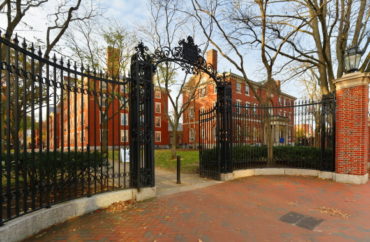
UPDATED
No more ‘official statements about public matters that do not directly affect the university,’ president says
Harvard University will no longer take sides on controversial public issues under an institutional policy announced Tuesday.
The change comes in response to criticism of the university’s handling of antisemitism, its initial response to the Oct. 7 Hamas attack on Israel, and its decision to fly a flag on campus in support of Ukraine in the conflict with Russia.
Interim President Alan Garber introduced the policy in an email Tuesday based on recommendations from a Institutional Voice Working Group, The Crimson student newspaper reports.
Garber said both he and the Harvard Corporation accepted the faculty group’s recommendation to restrict the university and its leaders from issuing “official statements about public matters that do not directly affect the university’s core function.”
The university compromises its “integrity and credibility” when it “speaks officially on matters outside its institutional area of expertise,” a report by the working group states.
“There will be close cases where reasonable people disagree about whether a given issue is or is not directly related to the core function of the university,” the report states. “The university’s policy in those situations should be to err on the side of avoiding official statements.”
Several times, the report states Harvard is not a “neutral” institution, because it “values open inquiry, expertise, and diverse points of view” in the pursuit of truth.
However, a policy that limits institutional statements on controversial issues “serves those values,” according to the working group. Taking a side undermines “inclusivity” and subjects administrators to intense pressure from competing outside parties, the report states.
The Crimson reports more:
Though the report will serve as a document that Garber and future University leaders can refer to when they are pressured to release a public statement, the report’s carefully worded language also provides administrators with enough flexibility to issue statements when they deem necessary to do so.
While administrators should not make statements on behalf of the University regarding external events, the statement clarified that some centers and clinics which advocate specific policies should continue to do so, but should not “purport to speak on behalf of the university or beyond their domain expertise” or “extend their zone of expertise unreasonably.”
In situations where scholars make personal statements on controversial issues, the working group recommends Harvard leaders clarify that the individual does not speak for the university.
The policy will apply to the president, provost, deans, and heads of departments, centers, and programs, as well as university governing boards and faculty bodies, according to the report.
The change appears to have strong faculty support. A recent Crimson poll found two thirds of Harvard faculty want the university to adopt an institutional neutrality policy.
Harvard’s decision also received praise from the Foundation for Individual Rights and Expression, which defends free speech on campus.
“Where Harvard leads, others often follow. We hope that more universities will use this summer to follow Harvard’s lead by adopting their own institutional neutrality policies,” FIRE executive vice president Nico Perrino said in a statement emailed to The College Fix.
Perrino said students and faculty should be the ones to debate and discuss difficult topics; these issues are “not for institutions to decide.”
Many Ivy League leaders have faced criticism in recent months for their responses to the Oct. 7 terrorist attack, antisemitism, and pro-Palestinian protests on campus.
In particular, former Harvard President Claudine Gay was met with strong backlash after she released a statement last fall that condemned neither the Hamas terrorist attacks nor an anti-Israel statement signed by dozens of student organizations, The College Fix reported.
Later, New York Congresswoman Elise Stefanik questioned Gay about why the university flew the Ukrainian flag on campus in 2022 while not doing the same for Israel, The Fix reported.
Gay, who later resigned, said the decision was made by her predecessor “as an exception to a longstanding rule.” She said the “standard protocol” is to fly only the American flag unless Harvard is hosting a visiting dignitary.
Editor’s note: Updated to include comments from the Foundation for Individual Rights and Expression.
MORE: Harvard, Penn lose major donors after botching response to Hamas invasion of Israel
IMAGE: Jan Yuan/Shutterstock
Like The College Fix on Facebook / Follow us on Twitter






Please join the conversation about our stories on Facebook, Twitter, Instagram, Reddit, MeWe, Rumble, Gab, Minds and Gettr.